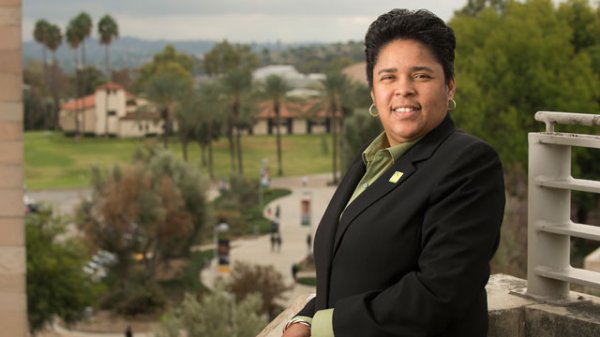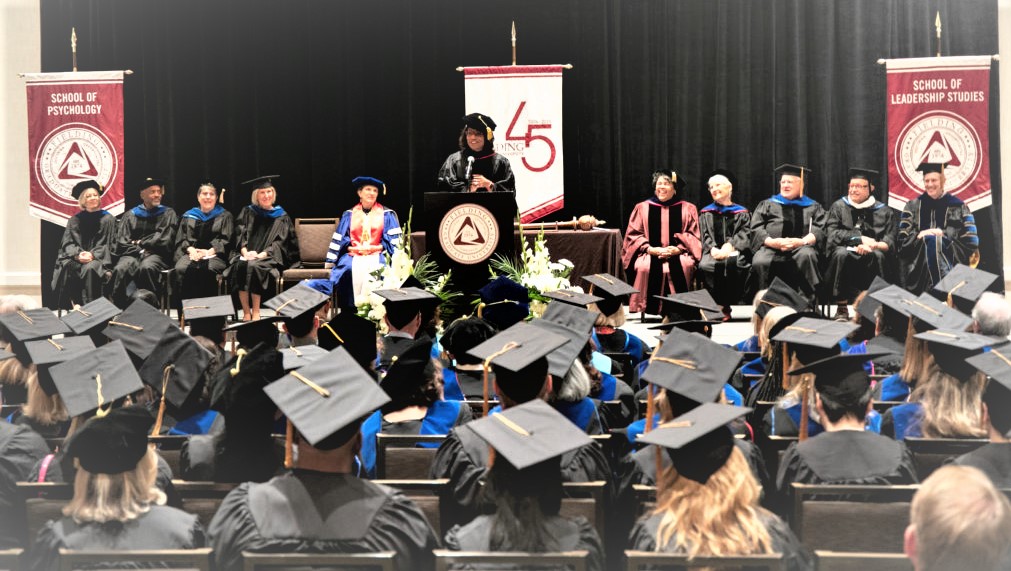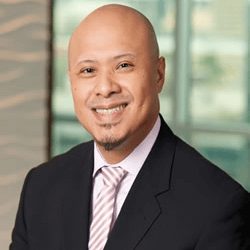
Monique L. Snowden is the Provost & Senior Vice President at Fielding Graduate University and the new guest in this Higher ED Thought Leadership Series by Emad Rahim.
Dr. Monique L. Snowden began her professional career as a business consultant and software developer for a global technology solutions and services firm, serving as expatriate project lead for one of the oldest and largest insurers in Japan. She has more than 25 years of experience in higher education leadership, with particular expertise in strategic enrollment management, institutional and educational effectiveness, and enhancing data and analytics for equity outcomes.
Currently, Dr. Snowden is teaching faculty for the University of Southern California Equity Institutes, 2015 – 2016 American Council on Education Fellow, and elected Commissioner on the WASC Senior College and University Commission. She earned a BBA in Business Analysis; MS in Management Information Systems; and PhD in Organizational Communication from Texas A&M University. Dr. Snowden holds certified designations as a Project Management Professional (PMP) from the Project Management Institute and Certified Information Systems Auditor (CISA) from ISACA.
Emad Rahim: Can you tell us how you started your career in higher education?
Monique L. Snowden: I started my career in higher education as a programmer analyst, supporting the student information system at Texas A&M University. I returned to my alma mater, following an approximate 5-year stint in industry as a business analyst and programmer for a global technology and consulting firm. I intended to return to the corporate sector within two years—after earning my master’s degree–but instead decided to pursue a doctorate degree. My career goal at the time was to secure a Chief Information Officer (CIO) position in higher education. Along the way, however, I developed a strong interest in the broader functioning of colleges and universities.
E.R: How would you describe your leadership style and how it has evolved during your time at Fielding Graduate University?
M.L.S: I strive to be a reflective and enlightened leader who knows, acknowledges, and understands my strengths and weaknesses. Moreover, I aim to amplify my strong points and attend to my learning edges accordingly. I do not necessarily conform to the notion of claiming a particular leadership style. My doctorate degree is in organizational communication. Thus, I tend to view leadership as a communication phenomenon enacted through sundry discursive practices, which altogether constitute one’s arc of leadership actions. In that regard, my leadership actions during my time at Fielding have evolved from being primarily transactional (tactical) to more characteristically transformative (strategic).

E.R: Please tell us a little about Fielding Graduate University: its mission, what makes its campus and programs unique, and the student population.
M.L.S: In 1974, Frederic Hudson, Hallock Hoffman, and Renata Tesch founded Fielding Institute—later renamed Fielding Graduate Institute and then Fielding Graduate University. Our founders had a progressive idea at the time. They set forth to offer access to high-quality doctoral education in a distributed delivery model. They recognized and emphasized that adults learn differently than adolescents and young adults. Consequently, from the onset, Fielding has attended to the needs and expectations of adult learners. The first degree offered was a PhD in Clinical Psychology, which 47 years later holds the distinction of being the only program of its kind offered in a distance format (not online) AND accredited by the American Psychological Association (APA).
The university’s mission calls attention to enhancing the knowledge, reach, and impact of its students by way of cultivating a community of scholar-practitioners. Furthermore, social and ecological justice are institutional beacons for our students, faculty, and staff—and evinced in Fielding constituents’ research, scholarship, and practice. Approximately 52% of our student body identify as persons of color; 60% are 40+ years in age. On the latter note, not only is Fielding a part of the Age-Friendly University (AFU) network, we have a long-established programmatic offering in Creative Longevity and Wisdom.
E.R: During your time as Provost and Senior Vice President and Vice President for Institutional Planning & Effectiveness at Fielding Graduate University, what institutional initiatives are you most proud of and why?
M.L.S: In responding to this question, I should first provide some context. I came to Fielding in 2009 as the inaugural associate provost for enrolment management. My pathways to the two position you reference have afforded me a deep and broad understanding of many aspects of the university.
The initiatives that have brought me the most professional and personal fulfilment are student-focused. My efforts to envision, lead, and support student success endeavors from the points of admission to graduation—and junctures between—are the most meaningful.
Time is not a luxury for many students. Thus, reducing program time-to-completion has been a monumental achievement, which required collective commitment by Fielding students, faculty, and staff. Parker Palmer is a renowned author, educator and activist. Palmer aspired to “put wheels” on his ideas. I have done that at Fielding, in terms of cultivating and bringing my ideas to fruition.
More Higher Ed thought leadership Series Interviews
Emad Rahim Interviews Dr. Mary Hawkins, President of Bellevue University
Emad Rahim Interviews Merodie A. Hancock, PhD President, Thomas Edison State University
E.R: Do your students have input on the faculty’s promotion, awards, and recognition programs? If so, can you expand on this and provide examples?
M.L.S: By design, Fielding does not have a faculty tenure and promotion process. The university employs contracted core faculty for programs, and those faculty receive peer-led evaluations. An essential part of the faculty evaluation process is to elicit input from students. For example, when a faculty member is due for an evaluation, the faculty personnel committee for their affiliated program will lead the process—which includes issuing a call for input from all students in the program regarding their possible engagement with and experience of the faculty member. Subsequently, the committee takes into account student input when conducting a holistic review and evaluation of the faculty member’s performance.
E.R: With more colleges and universities going online or offering hybrid options, what type of things is Fielding Graduate University doing to set your online programs apart?
M.L.S: Colleges and universities can distinguish their program offerings in various ways—e.g., pricing, duration, design, accreditation, and faculty expertise. Fielding’s best path forward involves making our value proposition clearer in terms of our long-history and experience with respect to offering and delivering distance education. On one side, some institutions will aim for and achieve significant scale, such as public universities’ online global campuses and well-established for-profit universities. On the other side, many institutions will not necessarily aim for highly scalable offerings—but still achieve success in their relative context.
Fielding is a small institution that currently has limited program offerings. The university is not, however, limited in its potential for increased market share. Our programmatic strengths are in the social science disciplines of education, human development, organizational development and change, leadership and psychology. Our institutional strength lies is our ability to attract prospective students seeking a more personalized experience, with proven success in elevating and expanding personal and professional opportunities for our students and alumni. Moreover, matters of diversity, equity, and inclusion are in Fielding’s institutional DNA—which presents opportunities to attract prospective students seeking programs that proffer the knowledge, competencies, and skills that yield significant impacts on addressing extant social issues and wicked problems.
E.R: With COVID-19 affecting the operation of every campus around the world, how can innovation and technology in the curriculum help keep college students and faculty safe?
M.L.S: I certainly understand and appreciate the focus of this question, in terms of student and faculty safety. An equally important issue is ensuring that academic leaders, despite the pandemic related challenges on higher education, are neither subjugating program learning outcomes nor student learning outcomes.
EDUCAUSE noted “Student Success Technologies” as a differentiating top-ten issue in higher education, from 2013 through 2016. A noted theme for 2019 was Empowered Students. EDUCAUSE notes, “In their drive to improve student outcomes, institutions are increasingly focused on individual students, on their life circumstances, and on their entire academic journey. Leaders are relying on analytics and technology to make progress.” In 2021, EDUCAUSE “refactored” their annual list into three issues, explicated in terms of “Restore, Evolve, and Transform.”

In terms of curriculum and technology, I think we need constructive curricular restoration, followed by learner-centered curricular evolution with transformative outcome possibilities.
E.R: In your opinion, what role does higher education play in responding to a global pandemic like COVID-19 and supporting social justice causes like Black Lives Matter?
M.L.S: We are witnessing the civil unrest and outcry of a nation that has failed to meet a basic social contract with its citizens. Higher education leaders, scholars, and researchers must resist and challenge prevailing tendencies to seek intellectual cover from racism in the academy and society.
I strongly believe that higher education holds a prominent place and bears a great responsibility in terms of diversity, equity, and inclusion. There is, however, a reckoning that we must face before higher education institutions and their leaders can more fully meet their charge and obligation. With that in mind, I offer the following for thought, deliberation, and dialogue:
1. White supremacists founded U.S. higher education and systematically excluded Black people and terminated First peoples, respectively, from mainstream society and institutions.
2. U.S. college and university campuses were built, libraries stocked, administrators selected, faculty hired, students enrolled, and endowments established under the trusteeship of those who amassed wealth from colonization, the sale of human beings, and slave labor. Thus, it stands to reason that the academy is the product, purveyor, and protector of its racist and colonialist founding, development, and operation.
3. Education leaders, broadly—e.g., institutional, associations, agencies, foundations—remain substantively heedless and thus complicit in upholding institutionalized racism within U.S. education systems.
4. Colonized curriculum perpetuates the continued legacy of racialized and colonialist conceptualizations that justify neoliberal intervention and exploitation of education. A critical step toward disrupting dominant worldviews and narratives is to recognize and address a lack of diversity in curriculum design; readings and assignments; teaching methods and practices; and learning philosophies, approaches, and assessments.
Responding to the disparities revealed by the global pandemic and social movements, such as Black Lives Matters, necessitates a deep interrogation of the role that higher education plays in perpetuating and reifying inequity, prejudice, and discrimination.
E.R: We learned a great deal about you and your school. If I was a potential student or employer that was stuck between choosing two different online doctoral programs, what other things would you want me to know about your degree and school to help with my selection?
M.L.S: First, I would encourage prospective students and employers to be clear about the delivery modality of academic offerings. Case in point, Fielding does not offer online doctoral programs. Conversely, the university offers doctoral programs that students can complete at a distance with varying degrees of residency requirements. I should also make clear that APA does not accredit online PhD in Clinical Psychology programs. Thus, this nuance is important to know and understand with respect to Fielding’s APA-accredited PhD in Clinical Psychology program.
Second, it is important for all involved to be mindful that, “Fit matters!” Decide on the experience you desire, concretize it with specific criteria, and then assess whether the program and institutions in your choice set are ideal selections.
Last, individuals seeking graduate-level learning experiences that yield demonstrable positive impacts for alumni who lead and support transformational change in individuals, groups, and organizations should consider Fielding. By the way, I am confident that there are less than six degrees of separation from you and someone who graduated from Fielding.
E.R: Many of our subscribers are new leaders in higher education or aspiring to become a college administrator, what recommendations or advice would you give them as they move forward in their careers?
M.L.S: I advise aspiring higher education administrators—within academic and administrative domains—to participate in formal leadership development and leverage opportunities for mentorship. For those aiming to secure senior and executive level positions, I strongly recommend engaging a coach to assist them with achieving their career goals and becoming a more effective leader.

Dr. Emad Rahim is an award-winning entrepreneur, educator, author, community leader and TEDx Speaker. He currently serve as the Endowed Entrepreneur-in-Residence at Oklahoma State University and teaches at the Jack Welch Management Institute in the Executive MBA program. He was recognized by the United Nations Foundation as a 2013 Empact100 Honoree for his social entrepreneurship work, received a Congressional Award for his community service and was the recipient of the Forty Under 40 Business Leadership Award sponsored by Syracuse University. His personal story was turned into a short documentary, “Against the Odds,” and featured in the Huffington Post and Forbes. He co-authored “Leading Through Diversity: Transforming Managers Into Effective Leaders” and “The 4-Tions: Your Guide to Developing Successful Job Search Strategies” and is a frequent contributor to the Refractive Thinker book series, CEO Magazine, TweakYourBiz and YFS Entrepreneurship Magazine. Fellow him on Twitter @DrEmadRahim











